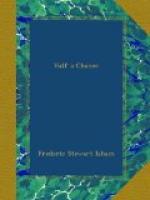“That weren’t fair play, were it now?” he said, looking at the bird. “That ain’t like a pal,” he repeated. The bird remained silent; he fancied reproach in its bead-like eyes, they seemed to bore into him. “And you such a small chap, too!” he muttered; then he turned his back on the island, and, with head resting on his elbow, uttered no further complaint.
That second day on the raft seemed much longer than the first; the second night of infinitely greater duration than the preceding one; but dawn revealed the island very near, so near, indeed, the bird made up its mind to try to reach it. It looked at the man for a moment and then flew away. Long he watched it, a little dark spot—now that he could no longer see the ruby on its breast! At length it was lost to sight; swallowed up by the green blur.
The small winged creature gone, the man missed it. “’Peared like ’twas glad to leave such a pal!” he thought regretfully. The floating timbers became well-nigh intolerable; he kept asking himself if he could swim to land, but, knowing his weakness from long fasting, he curbed his impatience. His eyes grew tired with staring at the longed-for spot; he suffered the torments of Tantalus, and finally could endure them no longer. So making his clothes into a bundle, he tied them around his neck and slipped into the water.
Half an hour later found him, prone and exhausted, on the yellow sands. Near-by, tall and stately trees nodded at him; close at hand a great crab regarded him with reflective interest, hesitating between prudence and carnivorous desire. Gluttonous inclination to sample the goods the gods had provided prevailed over caution; it moved quickly forward, when what it had considered only an unexpected and welcome piece de resistance abruptly got up. The tables were turned; that which came to dine was dined upon; a crushing blow demonstrated the law of the survival of the fittest; the weaker adorned the board. The man tore it to bits, ate it like the famished animal he was. More freely his blood coursed; he looked around; saw other creatures and laughed. There seemed little occasion for any one to starve here; the isle, a beautiful emerald on the breast of the sea, became a fair battle-ground; all he needed was a club and he soon found that.
For a week nothing of moment interrupted the even tenor of his existence; he led the life of a savage and found it to his liking, pounced upon turtles and cooked them, kept his fire going because he had but few matches. Lying before the blaze at night, near a little spring, he told himself that this was better than being behind prison bars; true, he lacked company, but he had known worse solitude—the “solitary.” In it, he had lain on the hard stones; here he had soft moss. If only he could reach out and touch those he hated—the unknown enemy whose face had bent over him a fleeting instant ere he had struck his hand from the gunwale; Dandy Joe and the police agent—if only they, too, were here, the place would have been world enough for him. But then, he felt, the time for the reckoning must come,—it lay somewhere in the certain future. Unconscious fatalist, he nourished the conviction as he nourished the coals of his fire.




